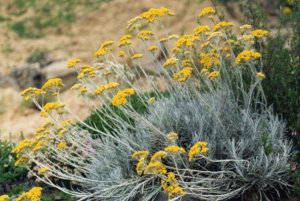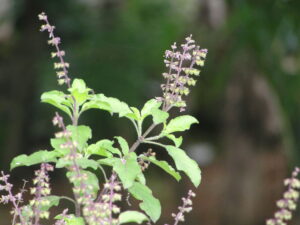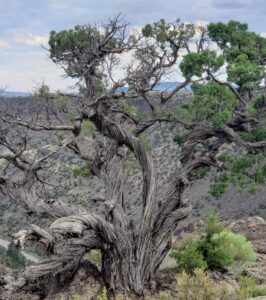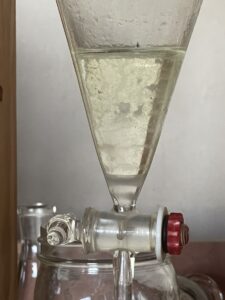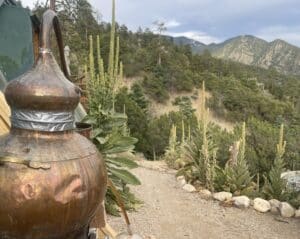Cathy and I have really enjoyed and learned a lot from doing individual consultations. I wanted to share an experience from one of our consultations a few days ago that re-reminded me of the alchemical power of rosemary essential oil.
We were working with a lady who has been a psychotherapist for many years. In our consultation the pain, suffering and traumas of her ancestors came through her—the sufferings of her ancestors immigrating from Europe to the US and the suffering of the generations before, the indigenous feminine Dark Goddess wisdom violently destroyed by patriarchy for centuries. I suspect that’s why she had become a psychotherapist. She was a wounded healer and didn’t know how to deal with all this buried trauma that was embedded deep in her cells, so she cared for others, because there’ll always be enough patients to keep us from working on ourselves.
We held the space for her and beheld her as she was able to finally feel all these intense feelings that had been suppressed and carried along for generations, and had been weighing on her like a great, invisible, undefinable burden, probably for her entire life. Her ‘symptoms’ had been a tendency to dissociate and a longstanding jaw pain.
Jaw pain reminds me of the monkey-headed Hindu god Hanuman whose name literally means jaw ‘hanu’ and disfigured ‘man’. (There are other interpretations of his name and to me they are all true.) Hanuman’s jaw was broken by Indra for his impetuousness when he was younger, and yet he grew up to be the fiercest defender of Rama, who represents righteousness and virtue. The jaw muscle is our strongest muscle and the jaw bone is the strongest bone. To me, Hanuman’s great power was in his Shadow at first, represented by the broken jaw. His wound, his broken jaw, transformed into his great power as his name reminds us. Similarly, I suspect that our client’s greatest power, which she was still unaware of, was in the Shadow of her jaw pain.
Our client was working hard on feeling these deep, ancient feelings. At times, she said she wasn’t sure she could go on, yet we knew she could. Our Unconscious never gives us more than we can process. It never lets us bite of more than we can chew. The way we get in trouble with the Unconscious is if we try to avoid it, pretend it doesn’t exist or don’t answer to its call. When people pretend they don’t have a Shadow, is when their Shadow devours and destroys them, as we see in addiction and many other problems in the world. Many years ago Jung said “The best political, social, and spiritual work we can do is to withdraw the projection of our shadow onto others.” and this quote seems more relevant today than ever.
While I knew our client was working hard, I wanted to call in additional guidance for her and the aromatic ally that immediately presented itself was Rosemary essential oil. While there are a number of uses of rosemary, for memory, remembrance and grief, it also has a very specific function in alchemy and was highly revered by certain alchemists. In fact it was a famous Portuguese alchemist, Raymond Llull who first distilled rosemary essential oil in the 13th century. I love the fact that alchemy gave us both a very useful model for personal growth (spiritual alchemy) and also hydrosols and essential oils, which is why it feels so perfect to be combining these two modalities in our work.
I discovered the alchemical ‘function’ of rosemary years ago, when I read in C. G. Jung’s last book “Mysterium Coniunctionis” I’m quoting the entire paragraph and the footnotes because it’s so rich in meaning.):
“Let us now turn to another ingredient of the mixture, namely the “rosemary flowers” (flores rosis marini). In the old pharmacopeia, rosemary (Rosmarinus officinalis) was regarded as an antitoxin, presumably on symbolic grounds which may be connected with its curious name. Ros marinus (sea-dew) was for the alchemist a welcome analogy for the aqua permanens, which in its turn was Mercurius (117). But what lends rosemary its special significance is its sweet smell and taste. The “sweet odour” of the Holy Ghost occurs not only in Gnosticism but also in ecclesiastical language (118), and of course in alchemy—though here there are more frequent references to the characteristic stench of the underworld, the odor sepulchrorum. Rosemary was often used in marriage customs and as a love philtre, and therefore had—for the alchemist—a binding power, which was of course particularly favorable for the purpose of conjuctio. (119) Thus the Holy Ghost is the “spiration” binding Father and Son, just as, in alchemy, he occasionally appears as the “ligament” of body and soul. These different aspects of rosemary signify so many qualities which are imparted to the mixture.
Footnotes
(117) Also called “ros Gideonis” with reference to Judges 5:36ff. This is an ancient idea, cf. Macrobius (Saturnalia, VII, 16)*: “There is in its [the moon’s] light something that flows down from it, which moistens bodies and soaks them with a kind of hidden dew.” Dew wakens the dead and is the food of the holy. (Zohar, 128b). (Zohar is the foundational text of the Kabbala) Irenaeus speaks of the “dew of light” in Gnosticism (Adv. Haer., I, 30, 3 and III, 17, 3). In Rabanus Maurus it is “God’s grace” (Migne, P.L. vol. 112, col. 1040). In Romanus it is Christ (Pitra, Analecta sacra, I, p. 139). Hermes Trismegistus meant dew when he said in the “Tabula Smaragdina”: “Its father is the sun, its mother the moon.” (De alchimia, p. 363). Dew is frequently mentioned in the Turba (e.g. in Sermo 58)
(118) Theodore the Studite (Pitra, I, p. 337): “Thou hast made right faith to give forth an odour above ointment.” “It imbued the whole world with the odour of knowledge.” (ibid., p. 342) The “Great Book of the Mandeans” speaks of the “odour of almightly life” (Lidzbarski, Ginza, der Schatz, p. 110). Compare the sweet odour of Sapientia with the perfume of the mother goddess in and around the temple of Hierapolis (Lucian, “The Syrian Goddess”, Works, I, p. 261 (http://www.sacred-texts.com/cla/luc/tsg/tsg07.htm)) and with the scent of the Tree of Life in the Book of Enoch (Charles, Apocrypha and Pseudoepigraphia, II, p. 205). See also Nestle, „Der suesse Geruch als Erweis des Geistes“ („The sweet smell as proof of the Spirit”), p. 95, and Lohmeyer, “Vom goettlichen Wohlgeruch“ (“Of the divine good aroma”) pp. 41F
(119) Baechtold-Staeubli, Handwoerterbuch, s.v. Rosmarin.“
From C.G. Jung “Mysterium Coniuntionis” para. 701 (p 491-492 Bollingen edition)
*My footnote to Jung’s footnote: The moisture is emotion, which makes life emotionally rich and alive, it’s feeling, and being swept up by a deeper awareness. The dew is hidden because it’s spiritual and immaterial, as well as material. Macrobius was a 5th century Roman writer, Saturnalia was about Roman customs. (https://en.wikipedia.org/wiki/Macrobius#Saturnalia)
In that short paragraph and the footnotes are an incredible amount of thoughts and information, a vast network of understanding and gnosis at the center of which, from this perspective, is Rosemary. I wanted to elaborate briefly on a few of the themes that Jung touched on. First, I want to say that this isn’t human intellectual knowledge, but to me ‘gnosis’, direct perception, as communicated by rosemary and recorded by the alchemists and then Jung, with the filters his age and perspective.
Rosemary, the dew of the sea (Latin ros + marinus) represents to me more beautifully than any other plant and aroma the simultaneity of spirit and matter. The dew of the sea is what Aphrodite, the Olympian version of the ancient Dark Goddess, was born from. The sea dew, as Jung says is also a symbol of the aqua permanens (the ever-enduring water, the goal of the alchemical process, the grace that descends and blesses our efforts), or Mercurius, the ever-changing spirit that graces the alchemical effort, which is the spirit in matter, the ‘juice’ of life so to speak, the immaterial that animates the material. While Jung goes on to talk about the Holy Spirit, I prefer to see this dance between matter and spirit as best represented by what in the Kabbalah is called the Shekina, the ‘descending’ part of God, and in the Kabbalah, the only feminine name of God. That ‘descending’ is the spirit in matter, it’s grace and another form of this archetype are the Virgin of Guadalupe as well as the Black Madonnas all over Europe. It is no accident that she cannot be eliminated by centuries of partriarchal Christianity and keeps appearing, because it is this ‘descending’, embodying aspect of the divine that people really plea to, because she understands and endures and reconciles spirit and matter. There is a sublime spiritual quality to enduring the sufferings of existence and embodiment and the Shekina, the Guadalupe, the Black Madonna, the Dark Goddess, the aqua permanens, the dew of the sea descend in the moments when our suffering is greatest, and she transforms it and us.
That is really the spiritual function of ‘sweetness’, that no matter how much suffering we experience or witness, there is a sweetness that comes from the awareness of spirit in matter. And through that sweetness, we experience grace.
To me, rosemary essential oil was also timely, because I felt our client could integrate what was coming up from her unconscious into her conscious, which is a taste of conjunctio, the sacred union and rosemary appears right before the union is complete, because of its ‘binding power’, which is why it was used in weddings in Europe for centuries.
This is the alchemy of the self, of the psyche, the marriage between ego and unconscious, body and soul and of suffering and bliss. The union is announced and symbolized by the rosemary. Just when we think we can’t go on, when our suffering or the suffering we have carried from our ancestors seems too much to bear, rosemary brings sweetness and grace and helps us along to the sacred union.
The sweetness of rosemary, and to me, the perception of smell, is what awakens us, which is why it’s called ‘the odour of knowledge’ (gnosis, i.e. direct perception of the divine in matter), the “perfume of the Goddess”. This sweetness, this direct perception is what many of us need as we go through life and feel overwhelmed by the endless bad news about the environment and politics, etc. There is so much suffering in the world right now and it’s easy to lose our spiritual perspective and so I wanted to remind you of rosemary, because we can all use a little of its sweetness and grace right now.
Florian

